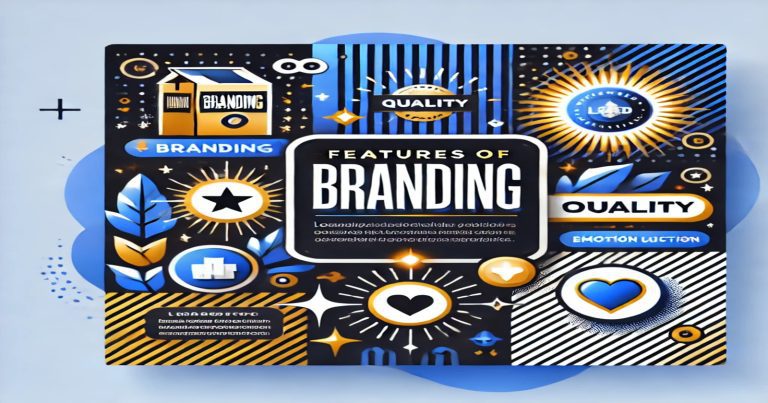Features of branding represent the basic ingredients defining how a business presents itself to the world. Branding goes beyond mere logos and taglines, and instead, encompasses the holistic identity of a company. The Features of branding create differences in businesses, emotionally connect value propositions building trust, uniqueness, and the ultimate customer loyalty. Understanding the features of branding in marketing helps create an image that can be easily memorable and has the potential for long-term success. Let’s start with what branding is, its features, elements, and importance.
What is Branding?
Branding is the process of creating a unique identity for a product, service, or company in the minds of customers. It encompasses every interaction a business has with its audience, from its visual elements to its tone of communication.
Features of Branding
The features of branding are Uniqueness, Consistency, Emotional Connection, Value Proposition, Relevance, and Longevity, etc. features of branding are explained in detail here:
Uniqueness
A unique brand always stands out from the competition. It offers something different, whether it’s a goods, service, or story, that makes customers remember it. A distinctive identity grabs attention and sets the foundation for strong brand recognition in a crowded market.
By being unique, a brand creates a lasting impression on customers. This uniqueness can come from innovative products, eye-catching designs, or a memorable message. It helps customers connect with the brand, making them more likely to choose it over others.
Consistency
Consistency ensures customers easily recognize and trust a brand. The use of the same colors, logos, and voice on all the media platforms develops an image for a brand. Be it posting on social media, on a website, or on the label of the product, reliability is built in all.
The consistency of branding instills confidence in the professionalism of the brand in the minds of customers. It reinforces the credibility of the brand and strengthens its identity in the minds of consumers. This can lead to long-term loyalty and stronger relationships with customers..
Emotional Connection
Effective brands create an emotional bond with their customers. They evoke feelings like happiness, trust, or excitement, which influence purchasing decisions. This emotional connection makes customers feel valued and understood, strengthening their loyalty to the brand.
By appealing to emotions, brands go beyond selling products or services. They create meaningful experiences that resonate with customers on a deeper level. This connection can turn first-time buyers into lifelong supporters who advocate for the brand.
Value Proposition
It establishes the value proposition for the brand- conveying what it promises to deliver quality, good customer experience, or something else-an easily defined value proposition ensures customers know what distinguishes the brand from the rest.
By fulfilling promises, a brand builds trust and satisfaction. A clear value proposition answers the question, Why should customers choose us? and creates a compelling reason for them to engage with the brand repeatedly.
Relevance
A good brand stays relevant by adapting to changing customer needs and market trends. While keeping its core identity, it evolves to meet new demands. Relevance keeps the brand fresh and appealing in a competitive marketplace.
The brand will stay on top of customers’ minds if it stays in tune with customer expectations. It listens to feedback, tracks industry changes, and embraces innovation, which makes it more likely to succeed over time.
Longevity
A well-established brand identity endures for decades, continuing to make an impact over time. Brands with longevity maintain their relevance and customer loyalty, even as trends evolve. This ensures a consistent presence in the market.
Longevity comes from building a strong foundation based on trust, quality, and relevance. When customers see a brand consistently delivering value over the years, it strengthens their connection and keeps the brand successful in the long run.
Elements of Branding
Building a strong brand identity involves various elements that work together to create a lasting impression. From the name and logo to tone and visuals, each aspect reflects the brand’s values, personality, and promise to its audience.
- Name: A name is the mother of the brand. It should be simple, memorable, and represent some value or offering of the brand. Examples: Apple, Nike, and Coca-Cola.
- Logo: A logo basically represents the visual identity of a brand. A logo is capable of giving instant recognition and often becomes synonymous with the brand. Features of a Good Logo: Simple, scalable, and relevant to a brand’s identity.
- Tone of Voice: The personality of the brand can be generated through its speaking style formal, friendly, or playful. Examples: Zomato’s witty tone and LinkedIn’s professional tone.
- Topography: Uses choice of Fonts and text styles to exemplify how the brand would look. Characteristics: Readable; Consistent and aligned with the Brand persona.
- Tagline: A tagline summarizes the brand’s essence in a few words. It should be catchy and reflective of the brand’s promise. Examples: Nike – Just Do It, McDonald’s – I’m Lovin’ It.
- Color: Colors evoke emotions and create associations. A brand’s color palette should align with its identity and values. Examples: Red for Coca-Cola (excitement), Blue for Facebook (trust).
- Image: Any brand’s images and visuals should reflect good quality and align with the values of that brand. Examples: Minimalist imagery of Apple.
Importance of Branding
Effective branding is essential for any business, as it shapes how customers perceive and connect with it. A strong brand not only builds trust but also drives recognition, loyalty, and long-term success.
- Builds Trust: A strong brand creates a sense of reliability and professionalism, encouraging customers to trust the business. When customers trust a brand, they are more likely to choose its products or services repeatedly, fostering long-term relationships.
- Differentiates from Competitors: Branding emphasizes what a business is uniquely different, and this gives the business an edge over others. A brand is able to distinguish itself in the market by letting its strengths speak for it, thus attracting the target audience better.
- More More Encourages Customer Loyalty: Relatable and consistent branding can go on to create an emotional relationship that turns customers into loyal advocates. Loyal customers will return and share the brand with others, hence increasing word-of-mouth marketing.
- Enhances Recognition: Correct branding enables customers to remember the business and brand correctly irrespective of the platform. Strong recognition makes it easier for customers to note the brand even in a competitive environment.
- Strengthens Marketing Campaigns: An integrated brand identity strengthens marketing campaigns, making them more effective. A strong and clear brand message strengthens all the campaigns so that they will appeal to the target audience and act according to the brand message.
Branding FAQs
What are the key characteristics of branding?
The key characteristics of branding are distinctiveness, consistency, emotional appeal, value proposition, relevance, and longevity.
Why do businesses need branding?
Branding helps in creating trust, distinguishes a business, and promotes customer loyalty besides making marketing more effective, thereby helping businesses grow.
What are the elements of branding?
The elements of branding include name, logo, tone of voice, topography, tagline, color, and imagery.
How does branding influence customer loyalty?
Branding emotionally connects with the customers, which increases the chances of loyalty and word-of-mouth advocacy for the brand.
What is the role of a tagline in branding?
A tagline encapsulates the heart of a brand and its promise, making it memorable and reinforcing its identity.


